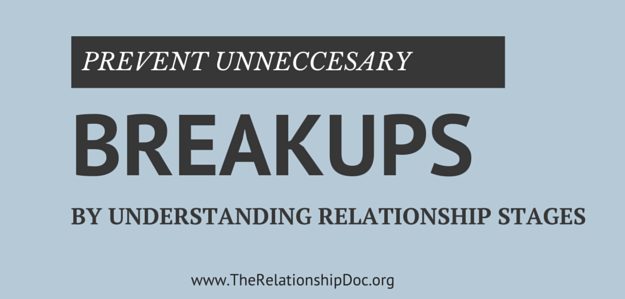 Unfortunately, many couples evaluate the health and compatibility of their relationship based on romances depicted in Hollywood. However, the “romantic period” is just one of several developmental stages that couples will go through as their relationship progresses, and (hopefully) deepens. The key is not to get stuck in any one stage, which is often what has happened when a couple decides to break up.
Unfortunately, many couples evaluate the health and compatibility of their relationship based on romances depicted in Hollywood. However, the “romantic period” is just one of several developmental stages that couples will go through as their relationship progresses, and (hopefully) deepens. The key is not to get stuck in any one stage, which is often what has happened when a couple decides to break up.
According to research conducted by Dr. Susan Campbell, there are five relationship stages that couples cycle through, during the course of their relationship. Below are brief descriptions of each one:
1. The Hollywood or Romantic Stage. This phase is akin almost to a drug addiction, as the same feel-good hormones, oxytocin and dopamine, are released in the brain when we’re “high on love.” While it’s a humorous comparison (the main difference being that the love is legal), new partners do tend to see each other through rose-colored glasses. They disregard and dismiss the negatives, if they are even noticed, and focus on hopes and dreams of the future.
2. The Power Struggle Stage. Also referred to as the hangover stage, this era begins when the romance fades away, usually anywhere from a few months to a few years down the road. Now reality kicks in and partners question their compatibility, while clearly seeing each other’s deficiencies and flaws. When couples don’t reach this stage before marriage, they may be more likely to break up.
3. The Stability Stage. If your relationship makes it past Stage #2, and you have learned to work through your issues, love comes back in the picture. It’s a more mature love this time around, as you’ve decided to stay together in spite of your differences. Most couples at this point have given up the desire to change their partner, and have mastered the art of compromise.
4. The Commitment Stage. When you reach this level, you not only love, but typically also like each other, and freely choose to be together without needing to be together. You are committed to your relationship, and realize as humans that we all have inadequacies. This is actually the stage when couples should marry – not in the infatuation period of early romance, as is most common in our society.
5. The Bliss or Co-creation Stage. Although some couples think reaching stage #4 means their work is done, the bliss stage takes things one step further. Here, the couple “team” moves beyond their personal relationship and their focus extends into the world, where they may create a family, a business, or some other project together. It is important to remember during this stage to continue to nurture, and not neglect, your intimate relationship while focusing outward.
Although these stages might seem progressive, they don’t necessarily occur in a particular order. In addition to having a unique pattern for each couple, the stages are cyclical and may revert to a different level at any time. All it takes is another power struggle, and you’re back at Stage #2. Or perhaps you started a family right after the romantic stage, then have to learn about dealing with conflict, reaching compromise, and finding bliss at a later date. Each relationship will move through its own cycle, at its own pace.
Couples who find themselves arguing over and over about the same old issues obviously haven’t worked through the power struggle stage. They may avoid each other, sleep in different rooms, or blow up from time to time, but never fully resolve the conflict. The power struggle stage is the most common stage for couples to get stuck. Often not having the tools to resolve conflict, many couples decide to part ways at this stage, or their relationship just limps along (sometimes miserably). Most likely, everyone knows an example of this unhappy dynamic, as it is so often that couples get stuck here. If you keep getting caught in this vicious cycle, it’s important to not wait before seeking out professional support with a couples counselor, in order to overcome the impasse.
Establishing independence and connection, while also respecting each other’s differences, may seem like a tall order to achieve. Although maintaining a blissful state might not be possible for all couples, the continued effort to grow and improve life together is what’s important, regardless of the current relationship stage we’re cycling through.